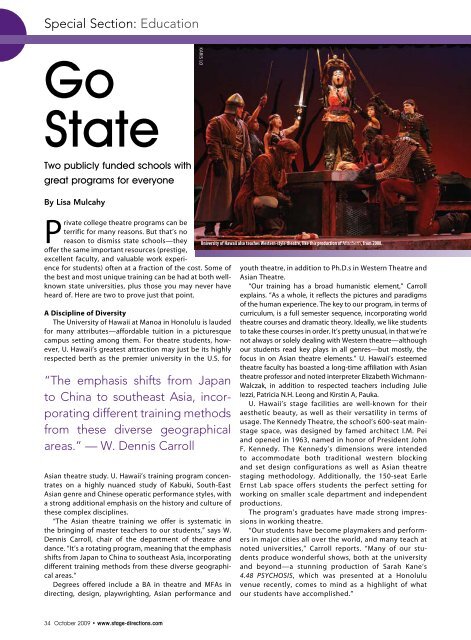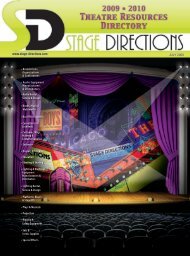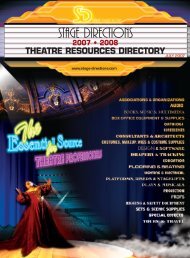Download a PDF - Stage Directions Magazine
Download a PDF - Stage Directions Magazine
Download a PDF - Stage Directions Magazine
Create successful ePaper yourself
Turn your PDF publications into a flip-book with our unique Google optimized e-Paper software.
Special Section: Education<br />
Go<br />
State<br />
Karis Lo<br />
Two publicly funded schools with<br />
great programs for everyone<br />
By Lisa Mulcahy<br />
Private college theatre programs can be<br />
terrific for many reasons. But that’s no<br />
reason to dismiss state schools—they<br />
offer the same important resources (prestige,<br />
excellent faculty, and valuable work experience<br />
for students) often at a fraction of the cost. Some of<br />
the best and most unique training can be had at both wellknown<br />
state universities, plus those you may never have<br />
heard of. Here are two to prove just that point.<br />
A Discipline of Diversity<br />
The University of Hawaii at Manoa in Honolulu is lauded<br />
for many attributes—affordable tuition in a picturesque<br />
campus setting among them. For theatre students, however,<br />
U. Hawaii’s greatest attraction may just be its highly<br />
respected berth as the premier university in the U.S. for<br />
“The emphasis shifts from Japan<br />
to China to southeast Asia, incorporating<br />
different training methods<br />
from these diverse geographical<br />
areas.” — W. Dennis Carroll<br />
Asian theatre study. U. Hawaii’s training program concentrates<br />
on a highly nuanced study of Kabuki, South-East<br />
Asian genre and Chinese operatic performance styles, with<br />
a strong additional emphasis on the history and culture of<br />
these complex disciplines.<br />
“The Asian theatre training we offer is systematic in<br />
the bringing of master teachers to our students,” says W.<br />
Dennis Carroll, chair of the department of theatre and<br />
dance. “It’s a rotating program, meaning that the emphasis<br />
shifts from Japan to China to southeast Asia, incorporating<br />
different training methods from these diverse geographical<br />
areas.”<br />
Degrees offered include a BA in theatre and MFAs in<br />
directing, design, playwrighting, Asian performance and<br />
University of Hawaii also teaches Western-style theatre, like this production of Macbeth, from 2008.<br />
youth theatre, in addition to Ph.D.s in Western Theatre and<br />
Asian Theatre.<br />
“Our training has a broad humanistic element,” Carroll<br />
explains. “As a whole, it reflects the pictures and paradigms<br />
of the human experience. The key to our program, in terms of<br />
curriculum, is a full semester sequence, incorporating world<br />
theatre courses and dramatic theory. Ideally, we like students<br />
to take these courses in order. It’s pretty unusual, in that we’re<br />
not always or solely dealing with Western theatre—although<br />
our students read key plays in all genres—but mostly, the<br />
focus in on Asian theatre elements.” U. Hawaii’s esteemed<br />
theatre faculty has boasted a long-time affiliation with Asian<br />
theatre professor and noted interpreter Elizabeth Wichmann-<br />
Walczak, in addition to respected teachers including Julie<br />
Iezzi, Patricia N.H. Leong and Kirstin A, Pauka.<br />
U. Hawaii’s stage facilities are well-known for their<br />
aesthetic beauty, as well as their versatility in terms of<br />
usage. The Kennedy Theatre, the school’s 600-seat mainstage<br />
space, was designed by famed architect I.M. Pei<br />
and opened in 1963, named in honor of President John<br />
F. Kennedy. The Kennedy’s dimensions were intended<br />
to accommodate both traditional western blocking<br />
and set design configurations as well as Asian theatre<br />
staging methodology. Additionally, the 150-seat Earle<br />
Ernst Lab space offers students the perfect setting for<br />
working on smaller scale department and independent<br />
productions.<br />
The program’s graduates have made strong impressions<br />
in working theatre.<br />
“Our students have become playmakers and performers<br />
in major cities all over the world, and many teach at<br />
noted universities,” Carroll reports. “Many of our students<br />
produce wonderful shows, both at the university<br />
and beyond—a stunning production of Sarah Kane’s<br />
4.48 PSYCHOSIS, which was presented at a Honolulu<br />
venue recently, comes to mind as a highlight of what<br />
our students have accomplished.”<br />
34 October 2009 • www.stage-directions.com

















